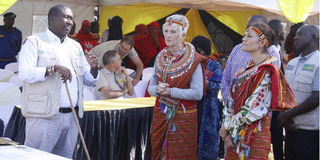Conservancies help residents cope with effects of drought

Northern Rangeland Trust (NRT) Chief Executive Tom Lalampaa (Left), Swedish Ambassador to Kenya Caroline Vicini and the Crown Princess of Sweden Victoria Ingrid at NRT headquarters on November 25, 2022. Sweden has given Sh285 million to support community conservancies.
Mr Billo Guracha, from Gotu in Isiolo County, has lost a monthly income of Sh300,000 this year after 52 of his camels succumbed to drought.
He sold camel milk worth about Sh10,000 daily but as the drought worsened, production declined.
Mr Guracha also lost more than 100 goats as the land became more bare under the scorching sun.
This tale represents what has happened to the livelihoods of hundreds of residents in his area and thousands of herders in northern Kenya.
He says the remaining 186 goats and 36 camels have survived because of support from the Nakuprat-Gotu Community Conservancy, one of 23 such sanctuaries established by locals and the Northern Rangeland Trust (NRT).
"Were it not for the conservancy, the impact of the drought could have been worse for me. The NRT has been supplying us with hay and pellets for domestic animals and wildlife. Our children are also getting bursaries," Mr Guracha says.
He and members of several conservancies in eight counties received a boost after the Swedish International Development Cooperation (Sida) provided Sh285 million to help communities in arid areas overcome the impact of the drought.
The funding will go to community conservancies in Isiolo, Laikipia, Marsabit, Samburu, Narok, West Pokot, Elgeyo Marakwet and Turkana under the Sida-Imara programme.
Conservation efforts
Sweden’s ambassador to Kenya, Caroline Vicini, said the money would go to conservation efforts, improving livelihoods and providing water, among other initiatives.
"The Imara programme is aimed at offering long-term solutions to climate change by encouraging pastoralism that does not degrade nature, enabling adaptation and offering skills for alternative income," Ms Vicini said.
Speaking at the NRT headquarters, NRT chief executive Tom Lalampaa said the Sweden funding has enabled 600 young people to acquire vocational skills through the 'ujuzi mtaani’ initiative.
About Sh90 million will be spent on providing water to communities, he added.
"The death of animals means loss of livelihoods for pastoral communities,” Mr Lalampaa said.
“Providing technical skills to youth and women will enhance resilience. Part of the money will support women’s groups engaged in the beadwork business and support clean energy projects."
The programme also promotes peace to end conflicts sparked by climate change.
The NRT supports 43 conservancies in the northern and coastal regions.





